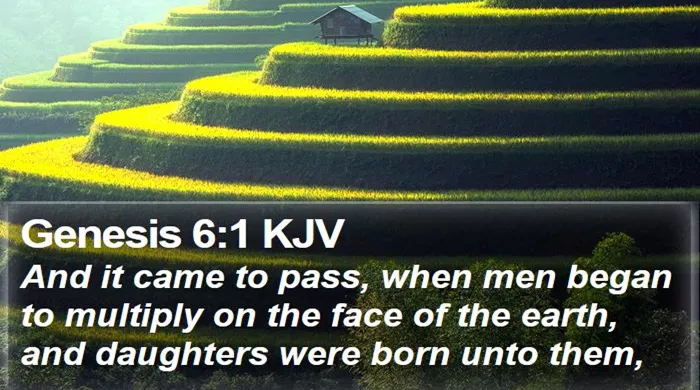Read the Daily Bible Verse Genesis 6:1 To Strengthen Your Spiritual Journey.
The Background of Genesis 6:1 KJV
Genesis 6:1 (KJV) states: “And it came to pass, when men began to multiply on the face of the earth, and daughters were born unto them.” To understand this verse fully, it is essential to examine its historical and literary context within the Book of Genesis.
Historical Context: Genesis, attributed traditionally to Moses, narrates the creation of the world, the early history of humanity, and the patriarchal figures of the Jewish faith. By Genesis 6, we encounter a transitional period in human history, just before the story of the Flood, which is a pivotal event in the Old Testament.
Literary Context: The verse follows the account of Adam and Eve and their descendants. It sets the stage for the narrative that describes the increasing corruption and wickedness of humanity, leading to God‘s decision to bring about the Flood as described in the subsequent verses.
The Meaning of Genesis 6:1
Genesis 6:1 serves as an introductory statement to a more detailed account of the conditions leading to the Flood. The verse mentions two key elements:
Population Growth: The verse notes that “men began to multiply on the face of the earth.” This reflects the fulfillment of God’s command to be fruitful and multiply, as given in Genesis 1:28. The exponential increase in human population is significant as it sets the stage for the societal dynamics that follow.
Birth of Daughters: The mention of “daughters” being born indicates a focus on family structures and relationships. This detail is crucial as it leads to the subsequent narrative involving the “sons of God” and the “daughters of men,” a topic that has been widely debated among scholars.
The Application of Genesis 6:1 in Life
Genesis 6:1, though a seemingly straightforward historical account, can be applied to modern life in several ways:
Human Growth and Development: The verse highlights the natural process of human population growth. In contemporary terms, it reminds us of the importance of understanding population dynamics and their implications on society and environment.
Family and Relationships: The mention of daughters points to the significance of family structures. In modern life, this emphasizes the value of nurturing healthy family relationships and the impact of these relationships on society.
Ethical Reflection: The subsequent narrative in Genesis 6 deals with moral decline. This serves as a reflection on the importance of ethical conduct and the consequences of deviating from righteous paths.
Comparison with Other Bible Texts
Genesis 6:1 can be compared with several other Bible texts to gain a broader understanding:
Genesis 1:28: This verse speaks of God’s command to Adam and Eve to “be fruitful, and multiply, and replenish the earth.” Genesis 6:1 fulfills this command by describing the population growth.
Genesis 6:2-4: These verses continue the narrative introduced in Genesis 6:1, introducing the controversial “sons of God” and “daughters of men.” Comparing these verses with Genesis 6:1 helps to understand the escalation of human corruption leading to the Flood.
Matthew 24:37-39: In the New Testament, Jesus refers to the days of Noah, drawing a parallel between the conditions of humanity before the Flood and the conditions before His second coming. This comparison underscores the moral and ethical lessons drawn from Genesis 6:1.
See also: Genesis 6:1-22 (Berean Study Bible)
Modern Significance
In modern times, Genesis 6:1 carries several layers of significance:
Historical Insight: The verse provides insight into the early stages of human civilization and its development. Understanding this can offer perspectives on historical and cultural growth.
Moral and Ethical Lessons: The narrative following Genesis 6:1 serves as a cautionary tale about the moral decline of humanity. It underscores the importance of maintaining ethical standards and the consequences of widespread moral failure.
Theological Implications: The verse sets the stage for discussions on divine judgment and redemption. It highlights the need for spiritual reflection and adherence to divine principles in contemporary life.
Conclusion
Genesis 6:1 is more than just a historical account; it is a verse that bridges the early chapters of Genesis with the narrative of the Flood. It sets the stage for understanding the moral and ethical decline that leads to significant divine intervention. By examining its background, meaning, and application, we gain valuable insights into human growth, family dynamics, and ethical conduct.
Commentary on Genesis 6:1
Genesis 6:1 introduces a crucial period in the Biblical narrative, marking the beginning of a transition from the early history of humanity to a time of significant moral and societal challenges. The verse reflects the natural process of population growth and the resulting societal changes.
It is essential to view this verse within the broader context of the Genesis narrative, especially in light of the subsequent account of the Flood. The emphasis on the birth of daughters and the growth of the human population sets the stage for the introduction of complex themes related to human behavior, divine judgment, and redemption.
In conclusion, Genesis 6:1 offers profound insights into the early history of humanity and the divine response to moral decay. Its significance extends beyond its immediate context, providing valuable lessons for ethical conduct and spiritual reflection in contemporary life.


